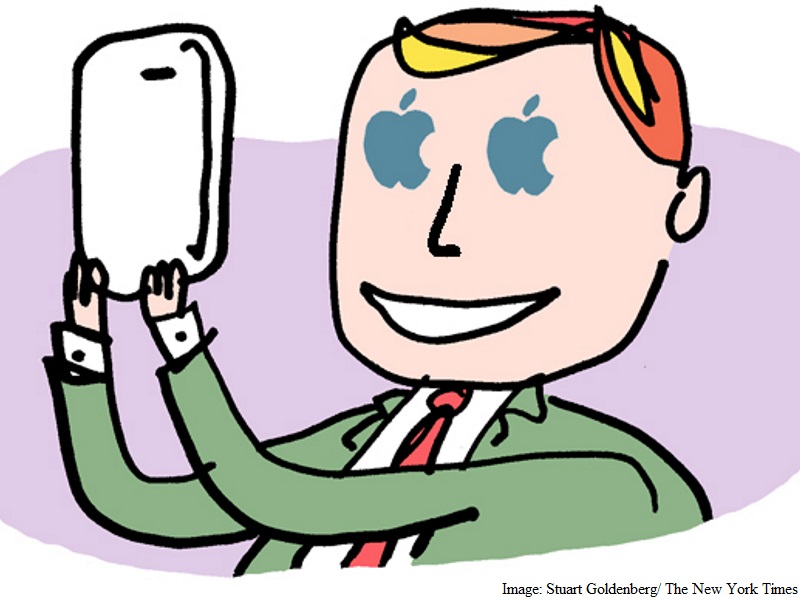- Home
- Mobiles
- Mobiles Features
- Eight Years On, iPhone Continues to Break Tech Industry's Rules
Eight Years On, iPhone Continues to Break Tech Industry's Rules

It's the same kind of carping that happens every year. The iPhone is by far Apple's most important product - it is, by most accounts, the single most profitable product on the planet - and for many analysts, that very significance highlights a vulnerability.
So tech observers are once again wondering how much longer Apple can sustain the magic. Has Apple done enough to maintain its outsize lead in the industry? Can the iPhone still expect to vacuum up virtually all of the profits in the global smartphone business?
It's time to ease off from the ritualized annual fretting about the iPhone's future. After several years of uncertainty about the iPhone's long-term prospects, it's clear that Apple has maneuvered the device into an enviable position, whatever the merits of its latest features. The iPhone's continuing dominance may not be a sure thing, but in the tech industry, it's as sure a thing as you can find right now.
If this doesn't surprise you, it should. In many fundamental ways, the iPhone breaks the rules of business, especially the rules of the tech business. Those rules have more or less always held that hardware devices keep getting cheaper and less profitable over time. That happens because hardware is easy to commoditize; what seems magical today is widely copied and becomes commonplace tomorrow. It happened in personal computers; it happened in servers; it happened in cameras, music players, and - despite Apple's best efforts - it may be happening in tablets.
In fact, commoditization has wreaked havoc in the smartphone business - just not for Apple. In the last half-decade, sales of devices running Google's Android operating system have far surpassed sales of Apple's devices, and now account for the vast majority of smartphones in use.
For years, observers predicted that Android's rising market share would in turn lead to lower profits for Apple (profits, not market share, being the point of business). If that had happened, it would have roughly approximated the way the Windows PC industry eclipsed Apple's Mac business.
"Hey, Apple, wake up - it's happening again," Henry Blodget, of Business Insider, warned in 2010. And again in 2011, 2012, 2013 and 2014.
None of those predictions came true. While the iPhone's sales growth slowed in 2013 and 2014, it rebounded to near-record levels later last year, and its profits have remained lofty.
Instead of killing Apple, commoditization caused something stranger: It hobbled Apple's main competitor in the smartphone business - Samsung, which until last year was gaining a creeping share of the profits in the smartphone business. At its peak in mid-2013, Samsung was making close to half of every dollar in the smartphone business, according to research firm Canaccord. (Apple was making the other half.)
But the rise of low-end, pretty great Android phones made by Chinese upstarts like Xiaomi - and the surging popularity of Apple's large-screen iPhones - put Samsung in a bind. In July, Samsung reported its seventh straight quarter of declining profits. Canaccord's latest estimate shows Samsung making 15 percent of profits in smartphones, with Apple making 92 percent. (The numbers add up to more than 100 because everyone else in the smartphone industry loses money, so their share of the profits is negative.)
You can expect Apple's proportion to grow. As analysts at Credit Suisse explained in a note last week, only about 30 percent of the world's 400 million iPhone users have upgraded to the large-screen models Apple introduced last year. Apple is bound to reap more money as the majority of its users inevitably jump to big phones over the next few years. In other words, for the foreseeable future, Apple stands virtually alone: It may be the only company making any money selling phones.
What's driving the iPhone's escape from the trap of commodity hardware is that it is more than a hardware device. Instead, an iPhone is a tightly integrated mix of hardware, great software and several pretty good services rolled into a single gadget.
Apple's suite of services is far from perfect; as I've argued before, for many people, Google offers a better range of cloud services to run on an iPhone. Still, Apple's services are good enough for most people, and as the company keeps expanding its ecosystem - covering payments and home and health devices - it will continue to build in different kinds of lock-ins for different kinds of users.
Some people stay with the iPhone for its better App Store, others for iMessage, and many grandparents for FaceTime video calling and iCloud photo sharing. Just about everyone stays because they find Apple's iOS mobile operating system simpler to navigate, and easier to maintain, than the fragmented Android landscape. Put it all together and you get a package that few of Apple's rivals can replicate.
But the iPhone is not just what it does, but what it means to its users - which is directly a product of the savvy way Apple has designed and marketed the device to produce global lust. As writer Ben Thompson has argued, the iPhone is in many ways a "Veblen good," the economic term for a product whose high price actually increases its desirability. Apple's resistance to selling low-end phones may thus feed into its success. iPhone resellers in Asia, for example, say that for many people, lower-end iPhones - even used ones - are seen as more desirable than more powerful, brand-new, but cheaper Android devices.
Across large swaths of the globe, in other words, the iPhone is a status symbol, which is not to say that it's frivolous - unlike a Prada suit, the iPhone is one status symbol that you'll still find extremely useful.
Of course, Apple's strategy is vulnerable to unpredictable shocks. Apple is betting on rising affluence across the globe to keep it in the black. If there's a slowdown in this rise - if the Chinese economy plunges, for instance, or, in the longer term, stagnant wages in Western countries push down consumers' desires to spend as freely on their phones - the iPhone will suffer. This explains why Timothy D. Cook, Apple's chief executive, rushed to reassure investors about the company's position in China during the recent Chinese market crisis.
For now, though, it's difficult to conceive of a particular way in which Apple's phone could fall to its rivals. Eight years after its introduction, the iPhone has won the biggest game in the world - and it will keep winning.
© 2015 New York Times News Service
Catch the latest from the Consumer Electronics Show on Gadgets 360, at our CES 2026 hub.
Related Stories
- Samsung Galaxy Unpacked 2025
- ChatGPT
- Redmi Note 14 Pro+
- iPhone 16
- Apple Vision Pro
- Oneplus 12
- OnePlus Nord CE 3 Lite 5G
- iPhone 13
- Xiaomi 14 Pro
- Oppo Find N3
- Tecno Spark Go (2023)
- Realme V30
- Best Phones Under 25000
- Samsung Galaxy S24 Series
- Cryptocurrency
- iQoo 12
- Samsung Galaxy S24 Ultra
- Giottus
- Samsung Galaxy Z Flip 5
- Apple 'Scary Fast'
- Housefull 5
- GoPro Hero 12 Black Review
- Invincible Season 2
- JioGlass
- HD Ready TV
- Laptop Under 50000
- Smartwatch Under 10000
- Latest Mobile Phones
- Compare Phones
- Vivo Y500i
- OnePlus Turbo 6V
- OnePlus Turbo 6
- Itel Zeno 20 Max
- OPPO Reno 15 Pro Mini 5G
- Poco M8 Pro 5G
- Motorola Signature
- Vivo Y50e 5G
- Lenovo Yoga Slim 7x (2025)
- Lenovo Yoga Slim 7a
- Realme Pad 3
- OPPO Pad Air 5
- Xiaomi Watch 5
- Huawei Watch 10th Anniversary Edition
- Acerpure Nitro Z Series 100-inch QLED TV
- Samsung 43 Inch LED Ultra HD (4K) Smart TV (UA43UE81AFULXL)
- Asus ROG Ally
- Nintendo Switch Lite
- Haier 1.6 Ton 5 Star Inverter Split AC (HSU19G-MZAID5BN-INV)
- Haier 1.6 Ton 5 Star Inverter Split AC (HSU19G-MZAIM5BN-INV)



















